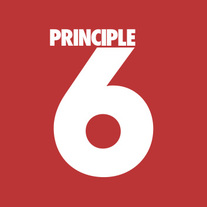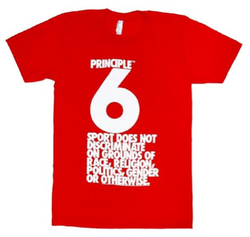 An eight-year-old girl named Sunnie Kahle was recently informed that she was no longer welcome at a Baptist elementary school in Virginia via a letter that informed her grandparents (who are her guardians) that her gender nonconformity is out of line with God's plan. One particularly scintillating excerpt reads, "God has made her female and her dress and behavior need to follow suit with her God-ordained identity." Uh... Let's leave aside, for the moment, the possibility that Sunnie is trans*. Let's assume (as her interviews seem to suggest) that she sees herself as female. This means the school administrators at Timberlake Christian have taken it upon themselves to decide what female "dress and behavior" look like. Unless the exactitudes of gendered fashion are spelled out in the Bible (and I don't remember reading that--do you?), this argument is absurd even on its own terms. God has "ordained" that this kid has to wear the kinds of clothing and play with the kind of toys that the execs at Disney and Walmart have decided is most effectively marketed toward her gender? Got it. As a former little girl who was occasionally mistaken for a little boy, I know first-hand that it's not always fun. Kids have hundreds of ways, subtle and not, to single out their norm-defying peers. Expressing gender nonconformity, especially as a kid, is hard. Sunnie Kahle should be lauded for using her God-given guts, not bullied by her school's administration for not fitting into their idea of what girls are "supposed" to be. I'm glad Sunnie has loving grandparents who stand by her just the way she is. If all kids were so lucky, I bet teen suicide rate would be a lot lower. In one interview, Sunnie's grandmother said that if Sunnie grows up to be a member of the LGBTQ crowd, she will "love her that much more." Unconditional love, total acceptance... sounds awfully Biblical. Maybe Timberlake Christian should take a page from grandma's playbook.
7 Comments
A highly subjective (and probably offensive) list of things some butches do (or that I've done myself) that bug me and/or others. I submit to you, dear readers, the question of whether, in YOUR ideal world, butches would stop doing the following:
Okay, dear readers... lay it on me. Which of these do you disagree with? Which do you agree with?  I love sports (almost) as much as the next dyke, but I have awfully mixed feelings about the Olympics this year. Russia's LGBT community is under constant, hateful, and often violent siege from its government. Gay "propaganda"--defined as anything depicting LGBTQ relationships in a positive or neutral light in a form accessible to minors--is illegal. This includes, as you can imagine, such "propaganda" as holding hands with your partner, wearing a T-shirt with a pink triangle on it, or even just being queer parents. Just a few weeks ago, the Russian government fined the editor of a newspaper who published an interview with a gay teacher. An interview, people. In a newspaper. Gay people in Russia are regularly bullied, chased, beaten up, and subjected to all kinds of hateful acts. In a way, maybe it's good that the Olympics are being held in Russia this year, since it will draw attention to the human rights violations that go on in Russia every day. Principle 6 is the Olympic principle that forbids discrimination on the basis of politics, race, religion, gender, or otherwise--a principle decidedly not embraced in Russia. The Principle 6 campaign is designed to raise awareness of the way LGBTQ people are treated in Russia and "and underscore that Russia's anti-LGBT discrimination is incompatible with the Olympic movement." I urge you to take the Principle 6 logo and make it your Facebook or Twitter image. I guarantee that people will ask you about it, which will give you more chances to spread the word.  And if you're a schwag-lover like me, you'll be happy to know that American Apparel has designed a very cool "Principle 6" clothing line, and it's money well-spent, since proceeds will support LGBTQ groups in Russia. I hope you'll spread the word, and help LGBTQ folks in Russia imagine a better world. A few years ago, I attended a professional graduate school at a good university. Recently, an acquaintance asked me how diverse my 200-person class was.
“Hmmm… I think I was literally the only lesbian,” I said. “But there were lots of LGBT people, right?” my acquaintance asked. And then she named seven or eight gay men who had, indeed, been in my class. In the moment, I murmured something like, “Oh, yeah that’s right.” But internally, I raised an eyebrow. Not only were these all men, but they were gender-conforming men, men who went to fancy prep schools, men who use “summer” as a verb and net annual salaries I could live off for a decade. But in my acquaintance’s mind, we were all people who slept with people of the same sex; we all checked the LGBT box. We were all undeniably, certifiably, and irrevocably queer. So why did I blanch being lumped in with these gentlemen? (BTW, I know a few of them personally, and they truly are great guys.) I think it’s because the things that made me feel alienated in graduate school did not have much to do with my attraction to women. In the upper echelons of this particular profession, no one cares who I carouse with or wake up beside. The things that made me feel alienated were, in order of their significance: (1) social class (2) gender nonconformity (3) persistent lack of interest in making lots of money The Nice Gay Men (NGM) of whom my acquaintance spoke shared none of these traits. Yet these are the traits that made me different from my peers, that let me bring a distinct perspective to the classroom, and that will continue to shape my voice in the future. But to the admissions committee, we all looked similar: white homosexuals with good grades from well-regarded undergraduate institutions. (Obviously, lots of other kinds of diversity are important: race, disability, religion, ethnicity, and others. I’m just focusing on one kind here, which isn’t intended to negate the importance of these other kinds, nor of the intersections of these other kinds of diversity with queerness.) I’m not suggesting that the NGM’s experience of LGBT life is somehow less “valid” than my own, nor that I embody “diversity” in a way that the NGM do not. But there was something ironic about being categorized with them, since they embodied precisely the traits that seemed so apparently lacking in me: wealth, gender conformity, a lucrative career path. I bring all of this up mostly to ask the following: when we say that we are striving for diversity, what is it we’re really striving for? People whose experiences somehow bring different “perspectives?” Maybe. But how do we measure that on a form? Do we want people who were statistically unlikely to end up in the application pool? Do we prize phenotypical diversity? Do we simply want the folks with the highest grades and test scores? And in achieving any of these types of diversity, what role should (and does) queerness play?  I mentioned this on my Facebook page recently, and it continues to chap my proverbial hide. The New York Times ran this story about how one butch went to a (male) tailor and asked him to make a men's suit for her. Last year. Yeah, you read that right: when Tomboy Tailors, Saint Harridan, Androgyny, and other companies were already on the scene. (I profiled some of them back in January and April.) Worse yet, the Times's story implies that this tailor had some amaaaazing new idea. The story begins with, "Breakthrough ideas often come from the least expected sources." The idea that a mainstream male tailor would make some suits for butch women is not a "breakthrough;" he was merely introduced to a market that he didn't know already existed. I don't fault the tailor--his quotes don't make it sound like he thinks he's a pioneer--but "discovery" is the thrust of the Times's story. Here's a quote: In a coffee shop near his home the other day, he [the tailor] seemed still struck by the world that opened to him after that initial email. "The whole thing is really strange, and sometimes I can't — " he said, his voice evaporating into the wonder of it all. He was not even sure how to identify Ms. Tutera [the Handsome Butch], gender-wise. Was she transgender or just mannish? Sometimes it was hard to know such things. In other words, Regular Person discovers Weird Queer Market. While the story pays lip service to the fact that queer-owned companies with this mission already existed, this bit of info comes several paragraphs into the article, after the article's framework is well in place. I'm happy to see any butch coverage in the media (see here and here for previous posts on the subject), but the Times article was one more reminder that butch visibility--and queer equality generally--still has a long way to go. |
|

 RSS Feed
RSS Feed